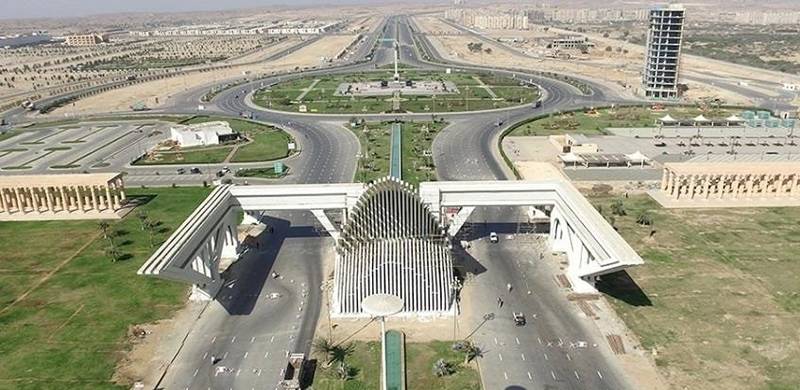
Pakistan is no stranger to land grabbing where the elite under the guise of development take land from the poor to build their housing societies. But a recent report on land grabbing in the outskirts of Karachi makes all other land grabbing moves seem like child’s play.
According to a report in Dawn, Sindhi and Baloch communities in Malir district in Karachi were through the use of force made landless. The perpetrator of this land grabbing is Bahria Town Karachi, which in collaboration with the government of Sindh took away thousands of acres of land from people who had lived and worked there for years.
The land in question is that of Malir and Jamshoro districts on the outside of main Karachi city. In May of this year, the Supreme Court had declared Bahria Town guilty of illegally acquiring thousands of acres of land in Malir. One of the clauses of the judgement barred Bahria Town from occupying any more land. However, satellite imagery shows that Bahria Town has continued its construction activities, expanding well into Jamshoro district.
Bahria Town has carried out its expansion in collusion with members of Sindh’s ruling party. One such collaborator is Sardar Malik Asad Sikandar, a Pakistan People’s Party MPA from Jamshoro, who has a stake in many housing societies along the Superhighway and is alleged to be part of BTK’s illegal land grabbing in Karachi.
The land grabbing has given birth to various criminal activities. One such activity is sand and gravel mining, which basically involves theft of river sand from Mole Naddi, a stream that falls into Malir River. This is illegal according to the Sindh (Prohibition of Taking Minerals Including Reti (Sand) and Bajri From Any Land) Act 2003. This activity is damaging the area’s ecosystem, as a professor from Karachi University informed media that the land where the sand is being mined from forms the support area of Kirthar National Park.
Moreover, construction requires large amounts of water, and BTK has been using sub-soil water to fulfil its construction needs. According to locals, there are 25 submersible pumps in Bahria Town, which pump water from sub soil aquifers. These sub soil aquifers are the only source of water for the villages in the area.
The case of Bahria Town’s illegal land acquisition in Karachi in collaboration with the government of Sindh and the criminal activities it has engendered raises questions on the state’s responsibility of protecting the weak. It also raises questions on the consciousness of the citizenry who turns a blind eye to these atrocities as they desire to buy plots in housing societies built on these seized lands.
According to a report in Dawn, Sindhi and Baloch communities in Malir district in Karachi were through the use of force made landless. The perpetrator of this land grabbing is Bahria Town Karachi, which in collaboration with the government of Sindh took away thousands of acres of land from people who had lived and worked there for years.
The landowners were targeted by both Bahria Town Karachi and Sindh police simultaneously. While the police, led by SSP Rao Anwar, would carry out raids on the village lands and book people on terrorism charges, Bahria Town Karachi personnel would intimidate them. Meanwhile, property agents would sell the registration forms for the illegally acquired lands.
The land in question is that of Malir and Jamshoro districts on the outside of main Karachi city. In May of this year, the Supreme Court had declared Bahria Town guilty of illegally acquiring thousands of acres of land in Malir. One of the clauses of the judgement barred Bahria Town from occupying any more land. However, satellite imagery shows that Bahria Town has continued its construction activities, expanding well into Jamshoro district.
Bahria Town has carried out its expansion in collusion with members of Sindh’s ruling party. One such collaborator is Sardar Malik Asad Sikandar, a Pakistan People’s Party MPA from Jamshoro, who has a stake in many housing societies along the Superhighway and is alleged to be part of BTK’s illegal land grabbing in Karachi.
The land grabbing has given birth to various criminal activities. One such activity is sand and gravel mining, which basically involves theft of river sand from Mole Naddi, a stream that falls into Malir River. This is illegal according to the Sindh (Prohibition of Taking Minerals Including Reti (Sand) and Bajri From Any Land) Act 2003. This activity is damaging the area’s ecosystem, as a professor from Karachi University informed media that the land where the sand is being mined from forms the support area of Kirthar National Park.
The sand and gravel mining have also resulted in a reduction in the water table, which is a serious issue for the farmers that own agricultural lands nearby.
Moreover, construction requires large amounts of water, and BTK has been using sub-soil water to fulfil its construction needs. According to locals, there are 25 submersible pumps in Bahria Town, which pump water from sub soil aquifers. These sub soil aquifers are the only source of water for the villages in the area.
The case of Bahria Town’s illegal land acquisition in Karachi in collaboration with the government of Sindh and the criminal activities it has engendered raises questions on the state’s responsibility of protecting the weak. It also raises questions on the consciousness of the citizenry who turns a blind eye to these atrocities as they desire to buy plots in housing societies built on these seized lands.
